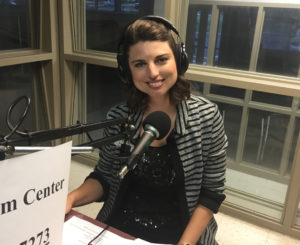As a journalism graduate, Brandi (Brown) Bartel (’04) has always made it a habit to stay on top of the local news. She frequents community meetings and public events, and she is always up-to-date with nearby police, media and prosecutors. However, despite her degree, Bartel is not chasing after a potential scoop. When she tunes in for the crime reports, she is wondering which ones might bring her tomorrow’s new clients.
Bartel is the executive director at The Victim Center in Springfield, Mo., which serves men, women and children who have survived any type of violent or sexual crime. The nonprofit agency offers free-of-charge intervention, advocacy, court support and counseling, as well as prevention education programming for the community. Annually, the center helps about 3,600 crime victims, and more than 15,000 individuals participate in their prevention education programs.
Once she graduated from Truman, Bartel began working as the center’s project director, writing and managing its grants. Initially, she just wanted to work for a nonprofit, any nonprofit, at which she could use her skills to help others. That changed abruptly.
“After only weeks into my tenure, I saw how the organization was able to change lives, and save them,” she said. “I saw hope in our clients’ faces, and I knew the mission of The Victim Center was making a direct impact on the citizens of our community.”
Only four years later, she was promoted to The Victim Center’s assistant director. Having seen Bartel’s potential early in her career, her boss quickly became her mentor.
“She gave me opportunities to learn and grow,” Bartel said. “I gradually worked my way up to executive director through several promotions, largely because I applied myself and took advantage of seminars and courses that allowed me to cultivate my nonprofit leadership skills.”
Bartel oversees The Victim Center’s 18 employees and more than 100 volunteers. The center’s staff and volunteers stay busy responding to hospitals for sexual assault cases, going to court with victims, counseling traumatized clients, assisting victims with protection orders and many more related services. Facing such an emotionally demanding profession, Bartel and her staff choose to focus on each day’s positive outcomes.
“Because of our work, adults can go back to work, children excel in school again, parents are stronger, families are healthier and our community is safer,” she said. “Clients sincerely thank us for saving their lives and often tell us that we gave them back hope. It can be an emotional roller coaster because you see the worst of humanity, but at the end of the day we feel good about the work we do to make a difference.”
The center has made a significant impact on the Springfield community, but Bartel still sees problems in the way society treats victims of violence. She and the center continue to work on dispelling the fear and shame that surround their clients.
“I still hear people blame victims for what happened, or for not being able to ‘save’ themselves,” Bartel said. “A lot of victims still don’t report the crime. But, slowly, I do see things changing in a positive direction.”
As awareness of The Victim Center’s accomplishments increases, so too does the demand. Since 2013, the center has seen 60 percent more people seek out its services, making it challenging for Bartel and her staff to keep up with the need for help. Like many nonprofits, The Victim Center could use more space, more staff and more funding. Bartel is working with her board to develop a strategic plan over the next three years that will specifically address those challenges, and she credits her experiences at Truman for preparing her to think about such complex scenarios.
“The liberal arts education I received at Truman gave me a solid platform for success,” Bartel said. “Directors have to be well-rounded individuals proficient in problem solving, critical thinking, organization, collaboration and communication. Some of these skills can come naturally, but they can also be learned through experience.”
Bartel’s daily responsibilities depend on that diverse expertise. Each day can bring a new task, from meeting with donors and community partners, to reviewing financial reports or even being interviewed by the media about crime-related stories. The work Bartel does is proof individuals with a liberal arts education are the ones best prepared to help society as a whole.
“It’s important that we talk about these issues and learn as much as we can about violence and abuse so that we can lay the foundation for safer and healthier generations to come,” she said. “Until then, we still have a lot of work to do.”
— KAIN KNEIB


